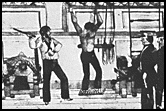
White-Jacket; or, The World in a Man-of-War:
White-Jacket, like the preceding Redburn, was written in a mere two months in a desperate attempt to bring some badly needed cash to the Melville household. Though Melville was unhappy with these two "cakes and ale" adventures, considering them to be superficial potboilers, they were among his more popular novels and, in fact, sold better than any of his subsequent productions.
![]() Return to the top of
this page
Return to the top of
this page
![]() Return to Melville Home
Page
Return to Melville Home
Page
![]() Return to the top of
this page
Return to the top of
this page
![]() Return to Melville Home
Page
Return to Melville Home
Page
It were the height of injustice to deny that Mr. Herman Melville is an improving and a vastly improved writer. He is no longer the wanton boy that used to give the rein to his wit and fancy, indulging in refined licentiousness of description, more seductive and mischievous than open violations of decorum, and in that smart dare-devil style of remark which perverts, while it dazzles, the mind, inducing habits of levity and irreverence of thought.... [T]he rattling youngster has grown into a thoughtful man, who, without any abatement of his rich and ever sparkling wit, has obtained the mastery of his own fancy, and fills life's log with sober entries, instead of defacing it with broad caricatures and sketches of still more questionable propriety. --London John Bull, February 2 1850
Mr. Melville has performed an excellent service in revealing the
secrets of his prison-house, and calling the public attention to
the indescribable abominations of the naval life, reeking with
the rankest corruption, cruelty, and blood.
He writes
without ill-temper, or prejudice, with no distempered,
sentimental philanthropy, but vividly portraying scenes of which
he was the constant witness, and in many instances suggesting a
judicious remedy for the evils which he exhibits. His remarks on
the discipline of our public vessels, are entitled to great
consideration, and coincide with the prevailing tendencies of the
public mind. It is not often that an observer of his shrewdness
and penetration is admitted behind the scenes, and still less
often that the results of personal experience are presented in
such high-wrought pictures. A man of Melville's brain and pen is
a dangerous character in the presence of a gigantic humbug, and
those who are interested in the preservation of rotten abuses had
better stop that "chiel from taking notes." --George
Ripley, in New York Tribune, April 5 1850
White-Jacket assumes to be a didactic rather than an
ornamental book -- a description of fact rather than a romance of
fiction.... [I]t will be perceived that although such a book may
be well written in all the points whereon the man of genius and
talent -- the writer of sea-novels -- may properly stand, its
didactic portions may be marked by crudities and puerilities that
would disgrace a school-boy. For it is unfortunately true, that
because a man produces a spirited and beautiful romance like
Typee, or an autobiography like Redburn,
running over with a Defoe naturalness and verisimilitude, it does
not follow that he is competent to discuss the fitness or
unfitness of the "Articles of War," the propriety or impropriety
of "Flogging in the Navy," or the whole system of government and
ceremonials of our "National Marine." The discussion of these
great practical subjects requires practical men -- men of
character, wisdom and experience -- not men of theories, fancies,
and enthusiasm....
... This constant attempt to be smart,
witty and entertaining on no capital, becomes dreadfully
tedious.... A little of it is very well, but as poured out by Mr.
Melville, in his stupid invention of a white-jacket, it appears
to be a stream of egotism, vapidness and affectation, with, here
and there, a fragment of amber on its waters. --Charles
Gordon Greene, in Boston Post, April 10 1850
Well, we are glad to find the author of Typee on the right ground at last. When we read his Mardi, or rather tried to read it, for we never could get quite through it, we feared that the author had mistaken his bent.... Redburn reassured us; and now comes White-Jacket, to reinstate the author in the best good-graces of the reading public. Not a page of this last work has escaped us; and so strong was the continuous interest which it excited, a quality not always encountered even in the most popular works of our time, that we accomplished its perusal in two "sittings," unavoidably protracted, we may remark, for we could not leave the work, while there was yet a page unread. --Frederick Swartwout Cozzens, in New York Knickerbocker, May 1850.
![]() Return to the top of
this page
Return to the top of
this page
![]() Return to Melville Home
Page
Return to Melville Home
Page
![]()
Please address all correspondence on
this Site to
jmadden@mail.multiverse.com
The Life and Works of
Herman Melville is brought
to you by Multiverse.